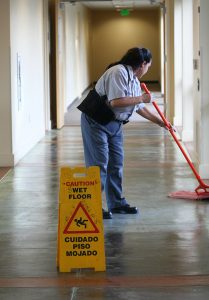Partner Spotlight Series
by Sumaiya Tufail
Tell us a bit about SEIU Local 2 and the work being done?

SEIU Local 2 is a private-sector labour union and a subset of a larger union, Service Employee International Union (SEIU), that is also present in the US and Puerto Rico. SEIU is a very important and powerful union in the US, one of the largest (with 2 million members) and is an important player for the labour movement. Here in Canada we are a much smaller fish, but we routinely go beyond what is expected from a union our size. Our sister locals include SEIU Local 1, SEIU West, and SEIU Healthcare.
One of the most important things is who we represent as members. We have a base of long term members, such as with Branch 300, the historic BC union of brewery, winery, and distillery workers, as well as new members who have recently become unionized.
Here in Vancouver where we have been organizing a lot, many of our new members are private-sector janitors who have joined through a campaign called Justice for Janitors. The Justice for Janitors campaign is how we got started here in Vancouver over 10 or so years ago. My colleague Christine Bro came out here as a single organizer in 2016 and started chasing this dream–Could we represent private sector janitors here in Vancouver? More than 8 years later now we do! We represent thousands of janitors across BC. In 2023 we managed to negotiate a city wide collective agreement for commercial janitors in Vancouver. Justice for Janitors is an important campaign, as many of these workers do essential work but are largely invisible. In office especially, they are often supposed to not be seen!
“You may never see the people that come and clean your office. But those are people who work a job and pay the bills and deserve to be in a union.”
A lot of them are immigrants, people of colour, who could be vulnerable to be taken advantage of, and many are in precarious jobs. Now they have someone they tell if something is off at work. If you think of any of the office buildings downtown, most didn’t have a union because they are subcontracted to private companies. Now, with a Collective Agreement, it sets a minimum standard for that work with basic protection. And now we can try to win the moon for them.
Why does precarity matter to you right now and for the future?
 Precarity is something I think about pretty much everyday. I think it is something that defines the nature of work in Canada and BC in this day and age. As a millennial, I think it’s something we all are familiar with. I was a precarious worker. I had to reapply for my job every 3 months. I felt the stress it brings into your life. We are fighting for job security and access to basic health care, such as not having to get a doctor’s note after one sick day. We are pushing to have these folks who are working for 5-10 years to have the bare minimum of job security. For me precarity is the way companies are hiring entry and mid range level-these jobs are precarious. It is rare to find a job that is secure that comes with full benefits and provides a pension! For my work it is us fighting precarity every single step we take.
Precarity is something I think about pretty much everyday. I think it is something that defines the nature of work in Canada and BC in this day and age. As a millennial, I think it’s something we all are familiar with. I was a precarious worker. I had to reapply for my job every 3 months. I felt the stress it brings into your life. We are fighting for job security and access to basic health care, such as not having to get a doctor’s note after one sick day. We are pushing to have these folks who are working for 5-10 years to have the bare minimum of job security. For me precarity is the way companies are hiring entry and mid range level-these jobs are precarious. It is rare to find a job that is secure that comes with full benefits and provides a pension! For my work it is us fighting precarity every single step we take.
One of the things about janitors that we can talk about is janitor work and precarity. There are 2 classes of unions (private vs public sector jobs). These 2 kinds of work are very different because a lot of people, at least Canadian, remember a time where being a school janitor was a decent job where you could do it and you could raise a family and retire. But that is not true for private sector janitors. Sub contracted private companies cleaning malls, offices, Skytrains, those workers are not working for the government or any public institutions. They have no benefits or job security, only a bare minimum wage paycheque. You can’t live on a job like that and most of them have to have multiple jobs. Before having a union it’s nearly impossible to get a pension or a raise. The companies are for profit and trying to extract value. The only tool we have to fight back is unionizing and that’s what we have done!
What has working at this organization taught you?
First, how life changing a permanent job can be. Second, in terms of activism and how to make things better, it taught me to go back to basics which is the number one lesson of organizing-meeting people where they’re at. Talking to people about what matters to them. A lot of the exploitation I see is with international students and people with vulnerable immigration status. As someone who identifies as a cis white woman, a lot of people experiencing precarity in BC don’t look like me or speak like me and it means having organizers who speak Punjabi or Tagalog to speak to the workers. It is an important reminder as someone with privilege that precarity has touched my life but it has not affected me at the level of these folks or others who are experiencing precarity.
Is there a particular project you’re excited about and why?
Yes, I am very excited about sectoral bargaining. It is very connected to precarity; I am currently working with UP-BC, the BC Federation of Labour and Jim Standford’s Centre for Future Work on this project of achieving new systems of sectoral bargaining in BC and Canada. It’s looking for a new model of unionization to adapt to our new economy. It is a big dream but I think it is a possibility. It is real tangible stuff. For me understanding precarity is understanding the world we live in. Jobs don’t look like the way they used to so we have to update the way we think, and organize to reflect the changes in our work. We can do this through sectoral bargaining. One of the easy ways to think about it is the Starbucks workers. Right now they have to go through unionizing and negotiating for each individual store separately. Sectoral bargaining says why not have these 10 stores unionize together.

